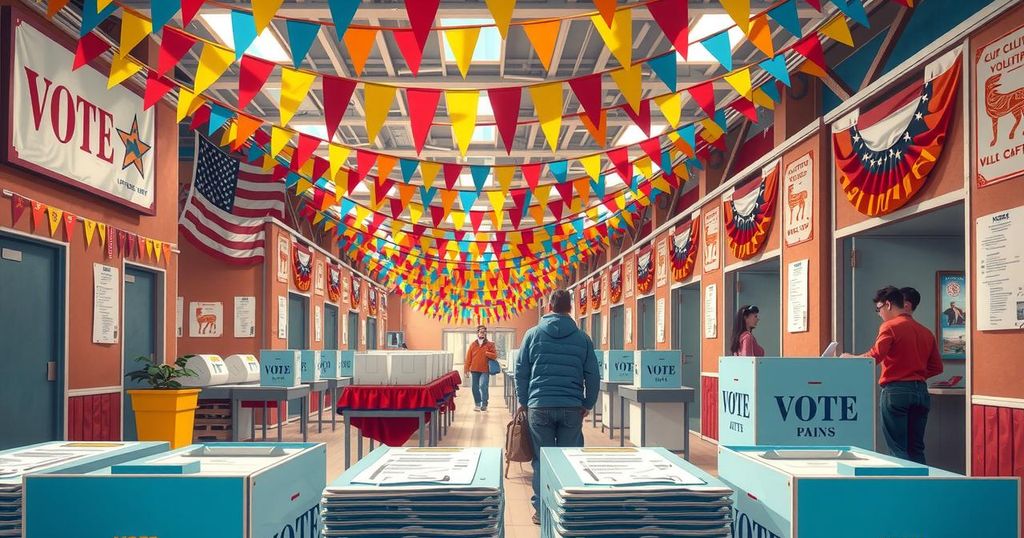Philippine Midterm Elections: Power Struggle Among Marcos and Duterte Families

Today, millions in the Philippines are voting in midterm elections that could affect the future of the Marcos and Duterte dynasties, with 18,000 positions up for grabs, including 12 Senate seats. Rodrigo Duterte is running for mayor of Davao while his daughter, Vice President Sara Duterte, faces impeachment proceedings. The elections are crucial for assessing political loyalties and shaping future leadership in the country.
In the Philippines, millions participate in the crucial midterm elections today, with over 18,000 positions open, including 12 notable Senate seats. Voting commenced at 07:00 local time and will continue until 19:00. These senate races are particularly significant as they could influence impending impeachment proceedings against Vice President Sara Duterte. Furthermore, voters are also selecting local officials, such as mayors and councillors, with former President Rodrigo Duterte vying for mayor of Davao City despite facing trial at the International Criminal Court.
The Duterte faction fields its candidates under the banner of DuterTen, featuring prominent figures such as Bong Go, a former aide, and Ronald dela Rosa, ex-police chief, both tied to Duterte’s controversial anti-drug campaign. The slate also includes others from the PDP-Laban, a historic political party surviving from the 1980s. Their candidacies mirror a loyalty to Duterte’s legacy amidst the ongoing political turbulence.
Bongbong Marcos, the current president, also has his share of big names in his senatorial lineup, which includes former celebrities and established politicians. His group, the Alliance for the New Philippines, is strategically composed of affiliates from influential families and business interests. Camille Villar, aiming to follow in her mother’s footsteps, exemplifies this intertwining of politics and familial ties prevalent in this election.
The political partnership, dubbed the “UniTeam,” sprung to life after their historic win in the 2022 elections, uniting the Marcos and Duterte clans. However, signs of division have surfaced since then, putting their alliance to the test just as the midterms approach. This rivalry is amplified by the stakes tied to both families’ legacies and political futures.
Despite being in The Hague, Rodrigo Duterte’s potential return to the mayoralty of Davao reflects a personal and political comeback strategy. His son, Sebastian, is running for vice-mayor, maintaining family control over the city. Critics perceive Davao as a hub of the Duterte regime’s violent anti-drug campaign, further complicating the former president’s anticipated return amid charges he faces in international court.
The elections symbolize much more than just local positions; they represent power dynamics and potential shifts in public support for the Marcos and Duterte families. For Bongbong Marcos, the election serves as a critical assessment of his presidential effectiveness while also determining the Senate’s stance on Sara Duterte’s impeachment. This could have long-lasting ramifications for her aspirations in the political landscape ahead of the 2028 elections.
In essence, today’s mid-term elections encapsulate a battle for political survival, influence, and legacy between two of the Philippines’ most prominent dynasties. As approximately 68.4 million voters make their choices across the archipelago, the results will decisively shape the future of the nation amidst rising tensions and national scrutiny over both families’ political activities.
The mid-term elections in the Philippines unfold today with enormous implications for the Marcos and Duterte families, alongside a sizable voter turnout across various levels of government. With both familial factions battling not only for power but also to sustain their political legacies, these elections could redefine the landscape of Philippine politics. The fate of Vice President Sara Duterte regarding her potential impeachment hinges immensely on the Senate’s composition following these elections, establishing the continuing rivalry that defines this political era.
Original Source: www.bbc.com







